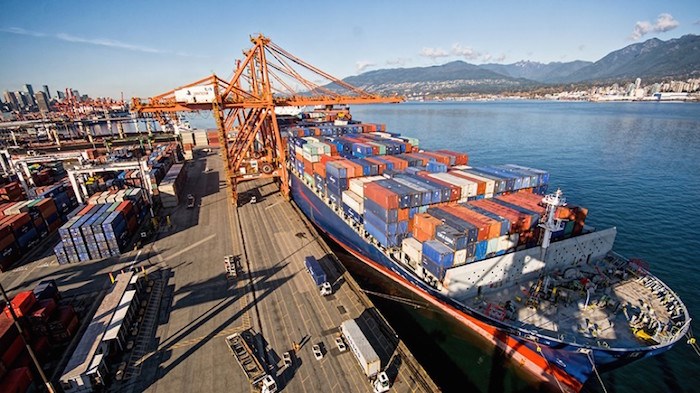Talks aimed at preventing a port workers’ labour stoppage Monday at Vancouver area port facilities continued throughout the weekend with no resolution.
The association representing port employers as well as the Port of Vancouver where they operate said Friday they remained hopeful a longshoremen’s work stoppage could be avoided.
 Photo by Chung Chow
Photo by Chung Chow
Thousands of members of the International Longshore and Warehouse Union (ILWU) Canada, are set to walk off the job today (May 27).
They voted 98.4% in favour of striking against B.C. Maritime Employers Association members several weeks ago.
The association is comprised of 55 ship owners and agents, stevedores, container, bulk and break terminal operators in ports from Victoria to the Alaska border.
The previous eight-year deal between the two sides expired in March 2018 but contract negotiations have continued into 2019 and were continuing into the weekend.
Association president Jeff Scott said the union delivered strike notice to container terminal operator GCT Canada for labour action to begin 7 a.m. Monday.
“We don’t want a labour dispute,” he said.
Global Container Terminals operates GCT Vanterm and GCT Deltaport in the Vancouver area.
But, Scott said, the association will continue to work through the weekend with a federal mediator in order to avoid a dispute.
“There is the possibility a strike at GCT to spread to the rest of the port,” Scott cautioned.
“There is a risk and we’re monitoring that very closely.”
A port-wide stoppage, Scott said, could cost $34 million a day in lost business and impact 34,000 jobs.
“We re doing everything to avoid that impact,” Scott said.
Port Metro Vancouver spokeswoman Danielle Jang said the port authority has no direct involvement in the labour negotiations as they are between the ILWU and BCMEA.
“One dollar of every three of Canada’s trade in goods beyond North America moves through the Port of Vancouver, so any type of work stoppage would be extremely disruptive to the business of the port and would have immediate and direct negative impacts throughout the supply chain, and on Canada’s economy,” Jang said. “We hope a disruption can be avoided, and that the two parties can reach a resolution quickly.”
ILWU Canada president Rob Ashton was unavailable to comment.
Business Council of British Columbia president Greg D’Avignon said his organization has expressed its concerns about strike impacts to Ottawa.
“We are urging the feds to use whatever means they can to find a resolution between the parties as soon as possible,” D’Avignon said. “This disrupts and impacts businesses, families of workers directly in the port and impacts indirectly thousands of workers and their families and businesses from multiple sectors that are import and export dependent such a natural resource firms, agrifood and consumer goods.
“This also impacts shippers, transportation related sectors, importers, retailers and consumers that rely on the supply chain and depend on the flow of goods and commodities.”
He said the fact the process ultimately leading to the strike notice has gone on so long is problematic.
“It is concerning that this process has been ongoing for so long despite knowing that shippers, and importers to mitigate this eventuality started making alternate transportation contingencies months ago,” D’Avignon said.
D’Avignon also mourned the potential loss benefits B.C. ports have seen from labour stability coupled with infrastructure investment and adding volume at the expense of other ports when they experienced labour strife may be lost.
“Sadly, that benefit and the lessons from it seem to have gone unheeded. Once volume is gone it is difficult to get back and the injury to a slowing economy is that much more impactful.”
The Port of Vancouver saw a nine-day lockout in 1999, a one-day strike in 1998 and another strike in 1995. In 2005, truckers withdrew services for six weeks.
Cargo handled via Canada’s West Coast ports grew faster than it did through their American cousins between 2017 and 2018.
Vancouver realized a 3% increase in the number of 20-foot-equivalent units (TEUs) moved through its facilities in 2018: 3,396,449 compared with 3,252,220 in 2017.
Total tonnage was up 3.5% to 147 million metric tonnes (MMT) from 142 MMT. Between 2016 and 2017, TEUs rose 11% and tonnage increased 5%.
Prince Rupert’s container cargo jumped 12% to 1,036,009 TEUs last year from 926,539 in 2017.
All other Prince Rupert terminals combined realized a 10% increase, with 26.67 MMT moved compared with 24.17 MMT in 2017.
When a labour dispute disrupted U.S. West Coast ports three years ago, those ports saw some departures of cargos to other ports – including Vancouver and Prince Rupert.
That dispute wound up in July 2017 when the U.S. ILWU signed a three-year extension of its contract with the Pacific Maritime Association.


